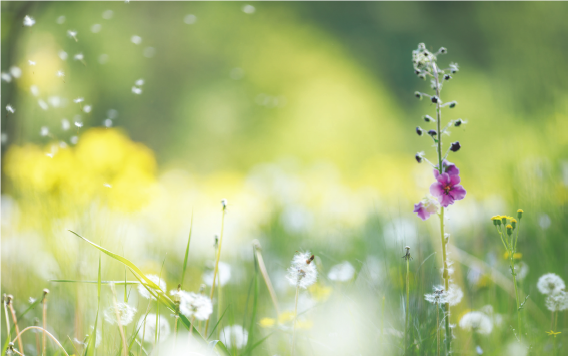
Six preventive strategies, plus treatments that help.
For people with seasonal allergies, the arrival of spring is a mixed blessing. “The classic symptoms of seasonal allergies are runny or stuffy nose, sneezing, postnasal drip, sore or itchy throat and dry cough,” says Maria Garcia, MD, a family medicine practitioner at Saint Barnabas Medical Center and a member of RWJBarnabas Health Medical Group. “I’ve even had patients tell me their ear canals get itchy.”
When nasal congestion isn’t controlled, sinus headaches can result. Red, itchy, teary eyes, otherwise known as “allergic conjunctivitis,” are another common symptom. “And if you have asthma, allergens can trigger an attack, so minimizing your exposure to them is very important,” Dr. Garcia says. The allergens that most commonly cause spring allergy symptoms are grass and tree pollen.
Seasonal allergies can begin in childhood or arise in adulthood, but treatments and symptoms are the same. For mild to moderate allergies, over-the-counter antihistamines, nasal sprays and eye drops can help.
To prevent or minimize symptoms, Dr. Garcia recommends these steps:
- Shower as soon as you come in from being outdoors. “Whether you’re an adult who’s been out for a run or a child who was playing outside, pollen can stay in the hair and cause symptoms,” Dr. Garcia says. Soap up and rinse off, wash your hair and change your clothes when you come indoors to minimize continuing contact with pollen.
- Rinse your sinuses. “This is an important one,” says Dr. Garcia. “When you breathe during exercise outdoors, pollen gets into your nostrils and sinuses. It’s very simple to take a nasal saline rinse—available in the pharmacy in little squeeze bottles—and squirt it into the nostrils.”
- Keep car and home windows closed. Keep the air conditioning on.
- Don’t dry laundry outside. “As clothes and sheets hang outside, pollen settles on them,” says Dr. Garcia.
- Consider using an air purifier. Air purifiers with HEPA filters, which force air through a fine mesh to trap particles, can remove airborne pollen and other allergens (such as dust or mold) from your home or office.
- Wear a mask outdoors. “The masks that people have been wearing to prevent COVID-19 are also helpful at screening out allergens,” Dr. Garcia explains. “However, allergens will stay on the mask, so wash it or dispose of it afterward.”
When To Call The Doctor
“If you have chronic symptoms that aren’t relieved by over-the-counter medications and they’re interfering with your life, it’s time to seek medical help,” says Maria Garcia, MD. “Talk with your primary care provider to see if you should make an appointment with an allergist.”
Untreated allergies can lead to sinus infections or can be accompanied by other, possibly related medical conditions, such as eczema or seasonal dermatitis (hives, also known as urticaria). Chronic rhinosinusitis—inflamed and clogged sinuses—can eventually lead to nasal polyps. “At that point, people may need to see a surgical specialist like an ear, nose and throat doctor to have the polyps removed,” says Dr. Garcia.
Doctors can prescribe more powerful antihistamines than the ones that are available over the counter. In addition, new biologic therapies, administered by injection, can help people with very severe, persistent symptoms. These new drugs are approved for most adults over 18, and some also have pediatric indications for children as young as age 6. “Depending on the drug, the injections may be given every two weeks or once a month,” says Dr. Garcia.
To find a primary care doctor at Saint Barnabas Medical Center, call 888.724.7123 or visit www.rwjbh.org/saintbarnabas.